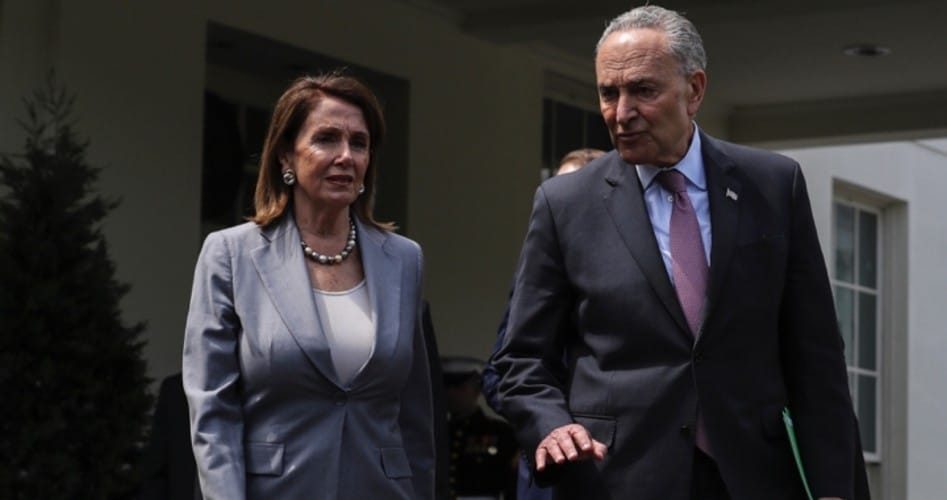
House Speaker Nancy Pelosi (D-Calif.) and Senate Minority Leader Chuck Schumer (D-N.Y.) said Tuesday that they and President Donald Trump have reached an agreement to spend $2 trillion on infrastructure over the next 25 years.
“It was a very constructive meeting,” Schumer said after the 90-minute conference. “We agreed on a number, which was very, very, good, $2 trillion for infrastructure. Originally, we had started a little lower and even the President was eager to push it up to $2 trillion. That is a very good thing.”
Schumer was also pleased with Trump’s willingness to negotiate even as House Democrats are engaged in a variety of investigations into the president’s alleged misdeeds.
“In previous meetings, the president has said, ‘if these investigations continue I can’t work with you.’ He didn’t bring it up,” Schumer said. “And so we’re going, I believe, we can do both at once.”
Funding, it would seem, is going to be the major sticking point in any negotiations. The federal government is already running huge deficits and has trillions of dollars’ worth of unfunded liabilities. Where is it going to get the money to pay for all this new spending?
Trump proposed a $1.5-trillion infrastructure bill last year that Democrats, in Pelosi’s words, “pooh-poohed” because it failed to account for most of its cost, relying instead on state and local governments and public-private partnerships to pay for it.
According to Schumer, Democrats will meet with Trump again in three weeks to hammer out a revenue deal. “We told the President that we needed his ideas on funding…. Where does he propose that we can fund this? Because certainly in the Senate, if we don’t have him on board it would be very hard to get the Senate to go along.”
Congressional Republicans, in fact, were excluded from Tuesday’s negotiations, though some administration officials attended.
What, exactly, does the administration hope to achieve with these negotiations? According to CBS News, “The White House didn’t have a blueprint going into the meeting.”
“We’re feeling our way, we don’t have anything in concrete,” top Trump economic adviser Larry Kudlow told reporters Monday. “We are developing our own policies internally. We very much want to hear what the Senate and House members, what the Democrats want to say, and we will try to react to that.”
Democrats, on the other hand, know exactly what they want, and it has very little to do with roads and bridges and everything to do with combating supposed climate change and rewarding favored interest groups.
“A big and bold infrastructure package must be comprehensive and include clean energy and resiliency priorities,” Pelosi and Schumer wrote in a letter to Trump Monday. “To truly be a gamechanger for the American people, we should go beyond transportation and into broadband, water, energy, schools, housing and other initiatives. We must also invest in resiliency and risk mitigation of our current infrastructure to deal with climate change.”
Senator Ed Markey (D-Mass.), one of the originators of the Green New Deal, has stated that he and his like-minded colleagues have “made it quite clear that if there is an infrastructure bill, we’re going to make it a green energy bill.”
Pelosi and Schumer also called for the bill to be “a major jobs and ownership boost for the American people — manufacturers, labor contractors, and women, veteran and minority-owned businesses.”
In short, Trump seems to want to pass some sort of vague infrastructure bill while Schumer, Pelosi, and company have very definite plans for how to spend taxpayers’ money.
“Trump and Republicans in Congress would like improved roads,” Americans for Tax Reform president Grover Norquist said in a statement to the Daily Caller. “The Democrats want Trump to endorse higher taxes so Democrats could, once again, spend on everything except roads.”
“Every time Republicans have foolishly given Democrats money promised to roads — the tax dollars are found far away from roads and in the pockets of Democrat special interests,” Norquist added.
Trump would be wise to consider Norquist’s warning — not to mention the Constitution, which doesn’t authorize federal spending on infrastructure — before agreeing to what could be a raw deal for both taxpayers and the economy.
Photo of House Speaker Nancy Pelosi and Senate Minority Leader Chuck Schumer: AP Images



